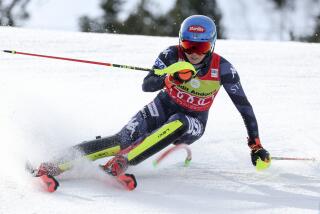Calgary World Cup Ski Racing : Despite Problems, Figini Closes In
- Share via
MOUNT ALLAN, Alberta — With the whole ski world watching, the Calgary Olympic Organizing Committee has been earnestly attempting to make the best of a bad situation for the past week.
The situation went from bad to worse Sunday at the women’s Husky World Cup downhill race at Nakiska ski area.
After a week of no snow and dangerously high winds, the skiers finally wedged in two training runs Saturday. The afternoon run was termed “dangerous” by one coach.
The organizers know that this race--the first test of this controversial Olympic mountain--was being watched closely. That might have led to Sunday’s problems.
The problem was one of over-zealous organizers attempting, in one night, to make up for a week of almost no snow.
After Saturday’s runs, with ice at the top and slush at the bottom, Currie Chapman, coach of the Canadian team, said that course conditions placed the athletes “at the edge of safety.”
To compensate, organizers ran the snow-making equipment overtime during the night. By the time course preparations were begun for Sunday’s race, it became clear that there was too much snow on the course.
In order to smooth the snow and distribute it more evenly on the mountain, officials sent snow-grooming equipment onto the sides of the course. The tractors mistakenly moved across the course, punching holes though the upper layers of crusted snow.
That caused the start of the downhill to be delayed one hour. Crews spread across the mountain, shoveling snow onto the course and others sidestepping uphill to pack the snow.
“Everything was falsely prepared,” said Heinz Krecek, the technical delegate.
To the athletes, who waited through four days of delays, the extra hour was irritating.
“It was a very tough week for me,” Maria Walliser of Switzerland said. “Everyone wanted to know how is it on the downhill, but we don’t know something. I think with the conditions not very well, it was a bad week for me.”
Walliser finished fourth Sunday, but is still the overall leader in the World Cup downhill. Asked if Mt. Allan was an Olympic-caliber mountain, Walliser hedged.
“It’s not disappointing, but maybe we had different dreams for the Olympic downhill,” she said.
“Next year, we know it will not be exactly the same. I just hope the changes are for the better.”
Michela Figini of Switzerland, who won Sunday’s race, said she liked the course better than she did Saturday.
“When I saw I was to be the No. 2 skier (down the mountain), I didn’t like it,” she said. “But when I see that there was much snow today, I think that it might be a good number.”
Figini’s win moved her within one point of Walliser in the overall standings, setting up a showdown next week in Vail, Colo.
Sunday’s Super-giant slalom race was canceled for the second time here. Officials hope to run that race in Vail. That poses yet another problem. Vail is the last World Cup race for both the downhill and Super G. Already there are two downhills scheduled, and it is likely that a second Super G will be run there
Meanwhile, the men arrive at Mt. Allen today. Their situation is not altogether perfect.
Already, the men’s downhill course has been shortened by some 50 feet to make use of the bottom of the mountain. The top is unusable.
The vaunted snow equipment here can cover over 75% of the mountain, although most of the courses are covered. Worse, the water pipes leading to the snow-making machines at the top of Mt. Allan have frozen, necessitating the lower start for the downhill.
The men have been in Vail, and their grumbling can already be heard here. “It will really hit the fan when the men get here,” said a COOC official.
The men skiers are considered the more militant, and if they find course conditions that they consider dangerous, they could very well boycott the races.
Krecek said that in 16 years in World Cup competition, he has never seen an event like this. “It’s been completely crazy in Calgary,” he said, speaking by phone to race officials in Vail as he juggled the schedule. “I’ll call you with updates. It does not stop.”
More to Read
Go beyond the scoreboard
Get the latest on L.A.'s teams in the daily Sports Report newsletter.
You may occasionally receive promotional content from the Los Angeles Times.







